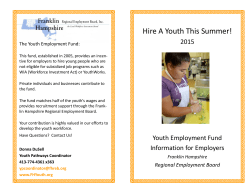
Provision of HR and Finance Services by Hampshire County
CABINET – 26 MAY 2015 PROVISION OF HR AND FINANCE SERVICES BY HAMPSHIRE COUNTY COUNCIL Report by the Chief Finance Officer and the Chief HR Officer Introduction 1. In July 2014, Cabinet agreed to join the Hampshire partnership as an operational partner for the provision of back office support services through their Integrated Business Centre with an expected go-live date of 1st July 2015. This report sets out the progress to date, confirms the services transferring and the savings that will be achieved both as a direct result of the partnership and those that are achieved as a consequence of the partnership. Progress to date 2. Since September 2014 work has been progressing with Hampshire & Deloitte to ‘on-board’ to the partnership. The initial stage of the project was the ‘fit-gap’ analysis which identified where there was a match or a gap in process between Hampshire and Oxfordshire services to be provided through the partnership arrangement. Through this process it was identified that some services or parts of services originally in-scope for transfer were either not undertaken by Hampshire or could not be delivered in a way that benefited Oxfordshire. The table at Annex 1 sets out what services were originally in scope and the services which have now been agreed to transfer in July. 3. Maintained schools in Oxfordshire will be able to purchase HR and Finance services provided by Hampshire through Oxfordshire County Council from July 2015. All maintained schools in Oxfordshire have now signed up for these services. Hampshire also developed an HR and Finance offer for Oxfordshire academies. Academies would contract directly with Hampshire for these services but they have chosen not to. As a consequence academies will need to secure these services from the market. To ensure the change is managed carefully, Oxfordshire has offered an extension of current services to academies until 31st December 2015. Project and Partnership Governance 4. The project governance is effected through an on-boarding project board which comprises senior officers from Hampshire, Deloitte and Oxfordshire. The board is responsible for making strategic and operational decisions, monitoring project progress and addressing identified risks, The project team is also drawn from the three organisations and they are responsible for delivery of eleven workstreams from the design phase, through build and test phases and finally the deploy phase. CA10 5. The existing Hampshire partnership is legally underpinned by an unincorporated public to public partnership. This enables each public body to jointly deliver and share the benefits of shared services between themselves. As a partnership rather than a commercial outsourcing, the expectation is that all partners (including Oxfordshire County Council) will collaborate and work together for the good of the partnership. Oxfordshire will join the partnership through a joint working agreement, retaining influence on the partnership through an operational forum which provides a basis for consultation and the exercise of influence in the management of the overall joint working arrangements. 6. The joint working agreement includes: a. Governance arrangements b. Service standards and performance measures c. Role and responsibilities of each partner in the process steps for each service area d. Apportionment of costs, benefits and liabilities 7. A number of reserved matters are also being agreed which will ensure Oxfordshire is able to influence any proposals in relation to the partnership which might affect Oxfordshire’s fundamental interests. These are currently being negotiated and will form part of the joint working agreement. 8. Oxfordshire is working closely with Hampshire to develop a performance management framework, based on financial and non-financial measures being collected as part of the governance arrangements above. Change Management & Business Readiness 9. Managers and staff across the Council and in maintained schools will be using new tools and related processes that are operated by the Integrated Business Centre from July 2015. These tools maximise the use of self-service and digital delivery which is beyond the current self-service offering. For schools staff and particular areas of the Council such as the Integrated Transport Unit and Children’s Home Support, this will be the first time that they will have had the opportunity to use online employee self-service. All areas will have greater manager self-service for HR, Finance and Procurement. 10. A comprehensive business readiness programme has been running since January 2015 focused on preparing all areas for the changes. This includes 30 council manager briefings and 18 schools leadership & governor seminars across Oxfordshire, walking future IBC service users through the changes. There is a network of 15 Change Champions representing all areas of the Council, who are acting as local experts and advisors on the ground. Concerns raised around specific service impacts have been captured and responded to so that follow up sessions are tailored accordingly. 2 CA10 11. There are four large scale process briefing events planned in early June 2015 with an expected turnout of around 1000 staff and there will be an e-learning course covering the changes around procurement and recruitment specifically. Weekly messaging will commence in May 2015 to all staff about key points they need to be aware of as we move towards go-live. From July 2015 `super-users’ will be located in key locations, they will add an additional layer of support alongside the Customer Interaction Centre in Winchester. From September 2015 monthly face-to-face training will be run for those managers who are finding the technical and behavioural changes particularly difficult. Financial Implications 12. The report to Cabinet in July 2014, set out that the Medium Term Financial Plan (MTFP) included savings for Oxfordshire Customer Services of £3m. Of this, the target saving for HR and Finance through externalisation was £0.681m. At that time, the HR/Finance savings set out in the full business case were within the range expected from the market and the target saving was expected to be achieved by joining the partnership. 13. One off transitional costs identified in July 2014 were expected to be in the region of £6m, which were considered broadly similar to costs incurred if alternative business models, such as an outsourcing, were adopted. Transitional costs are still expected to be around £6m, however they cannot be confirmed until after July as any staff that are redeployed between now and then will reduce the redundancy cost. 14. As set out in paragraph 2, the scope of services actually transferring to Hampshire is less than originally envisaged, at least in the first instance. As a result of this, the level of direct savings has also reduced from the original business case. Savings of £0.670m will be achieved relating to the provision of HR and Finance services. 15. However, additional savings are expected to be made from a reduced management team (£0.200m) and in relation to those services now out of scope, lean reviews are expected to generate savings equivalent to those that would be expected under the partnership (£0.155m). It is appropriate therefore to consider these savings alongside the direct savings. Offsetting these additional savings is an increased cost of ICT (£0.220m) which relates predominately to the annual contribution each partner makes to future proofing ICT infrastructure. In total therefore, savings directly and indirectly relating to the transfer to Hampshire total £0.805m. The partnership also facilitates the vacation of Unipart House and enables the savings already in the MTFP of £0.759m to be achieved. 16. To reflect the impact of changes to the scope of services being transferred to the partnership and to reflect the impact of including savings relating to the service management team and the lean reviews, the savings target in the Medium Term Financial Plan was increased to £0.716m. This is directly 3 CA10 comparable to the saving of £0.805m which will be achieved. As the partnership commences in July, part year savings will be made in 2015/16 with a full year impact from 2016/17. 17. In addition to the financial benefits of joining the partnership, there are also some key non-financial benefits. From July 2015, the Council will no longer be running SAP for HR and Finance which means that there will be no future licence liability for the Council. Also, with an increasing number of schools converting to academies, the ability to sustain back office services was increasingly unviable. Furthermore, additional self-service functionality was needed for the Council and for maintained schools and this will be delivered by joining the partnership and avoids further substantial investment from Oxfordshire. Joining the partnership therefore provides ‘future-proofing’ of these services. 18. There is still an expectation that further savings will be achieved from the partnership over time through the addition of new partners and further process improvements. Staffing Implications 19. Staff consultation was undertaken from January to March 2015. Generally, staff in services in scope for transfer to the partnership would TUPE to Hampshire County Council employment and be based in the Integrated Business Centre in Winchester. The exception to this is the Schools HR and Finance services which will remain contractually based in Oxfordshire, located at Abbey House. The expectation is that the majority of their time will be spent in Oxfordshire maintained schools. Given the distance from Winchester and various changes to terms and conditions, there was no requirement for employees to TUPE to Hampshire. As part of the consultation, staff were required to confirm if they intended to transfer to Hampshire. 20. A total of 11 staff (9.16 fte) in the Schools Finance team will transfer to Hampshire County Council. Staff who have chosen not to transfer are at risk of redundancy and will be given a severance package if it is not possible to redeploy them. Vacancies across the council, as they occur, are being made available as redeployment opportunities for staff that are at risk of redundancy. 21. Currently, a total of 79 staff (67.45 fte) will be redundant on 30th June 2015. The total cost, excluding estimated pension strain costs is £1.321m. This figure will reduce if staff take up redeployment before that date. Risk Management 22. The last report to Cabinet in July 2014 set out some risks specific to the Hampshire partnership which are relevant to be updated now. 4 CA10 23. The partnership works on a cost share basis. In July 2014 it was not clear how cost increases would be controlled. The mechanism for controlling cost increases is now covered in the proposed Deed of Accession which aims to protect Operational Partners from ‘disproportionate impact’. In addition all matters relating to changes to levels of financial contribution will be approved in the setting of the annual budget in accordance with the Governance Protocol. 24. At the time of the report in July 2014, the Hampshire IBC had been operational for less than four months, so a track record of service delivery was not available. The Operating model has now been live for just over 12 months during which time all new partners have on-boarded on time, commencing with Hampshire County Council in April 2014, 500+ Hampshire Schools in July 2014, Hampshire Fire & Rescue in August 2014 and Hampshire Constabulary and Police & Crime Commissioner in November 2014. 25. The experience to date has indicated that ‘on-boarding’ is a significant change programme which affects the whole organisation and the adoption of the new model by the organisation and its suppliers has been shown from the partners who have on-boarded to date to take around six months to embed. The expectation is similar for Oxfordshire. 26. In accordance with the project timetable, systems and user testing is still in progress and matters arising are being risk assessed in order to prioritise project resources both pre and post project go-live. The most significant project risk in the run up to and just after go-live is resourcing. This is being monitored closely by the Oxfordshire project board. RECOMMENDATIONS 27. The Cabinet is RECOMMENDED to note the progress made in joining the Hampshire partnership as an operational partner for the provision of back office support services with a confirmed go-live date of 1 July 2015. LORNA BAXTER CHIEF FINANCE OFFICER STEVE MUNN CHIEF HR OFFICER Background papers: Cabinet: 15 October 2013 – Item 8; 15 April 2014 – Item 8; 15 July 2014 – Item 11 Contact Officers: Lorna Baxter, Chief Finance Officer Tel: (01865) 323971 Steve Munn, Chief HR Officer Tel: (01865) 815191 Graham Shaw, Deputy Director, OCS Tel: (01865) 797228 May 2015 5 CA10 Annex 1 Services originally in scope for partnership with Hampshire Finance Technical Team (Tax) Finance Service Desk Banking & Control Accounts Payable Income Team Central Buying Team Specialist Payments (part) HR Pay & Employment Information (Directorates) Payroll Control Data Management & Reporting Resourcing HR Vetting & DBS Learning & Development Administration HR Advice & Helpdesk Education Support Service Pay & Employment Information (Schools) Schools Finance Schools HR Services confirmed in scope for partnership with Hampshire Finance Technical Team (Tax) Finance Service Desk Banking & Control (part) (bank reconciliation query resolution not in scope) Accounts Payable Income Team (part) (Adult Social Care debt query resolution and legal work relating to debtor chasing not in scope) Central Buying Team (part) (Setting up of vendors & catalogues, sourcing, tendering & contract management plus strategic procurement out of scope) HR Pay & Employment Information (Directorates) Payroll Control Data Management & Reporting (part) (Reporting out of scope) Resourcing HR Vetting & DBS Learning & Development Administration Education Support Service Pay & Employment Information (Schools) Schools Finance Schools HR 6
© Copyright 2025











